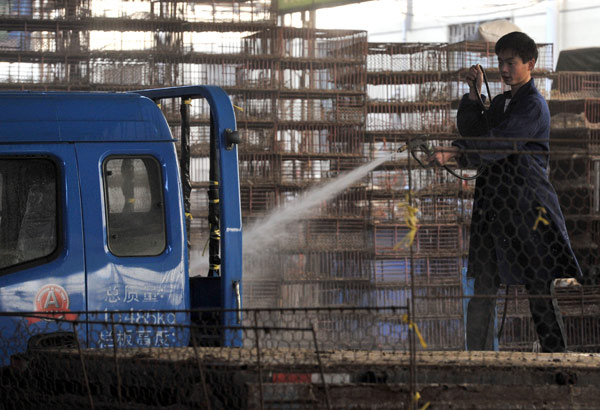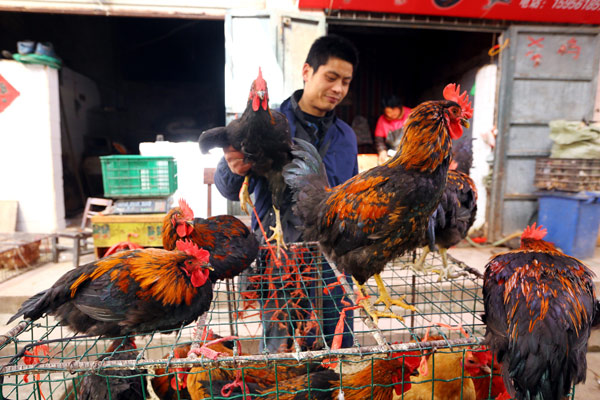'Sporadic virus'
Beijing resident Wang Shuqing, 58, was on a drip at the fever clinic of the hospital. His wife, Li Shuang, sat on a chair in the corridor, wearing a blue surgical mask and looking anxious.
"We all experienced SARS in 2003. We were frightened by the reports of the deaths from bird flu in some southern provinces, so to avoid cross-infection we treated him at home with antipyretics. However, almost a week has passed and still the medicine hasn't helped to reduce the fever," she said.
"It's my fault. I insisted on treating him at home after he developed the fever. If we had sent him to the hospital earlier, his fever wouldn't have developed into pneumonia. Now he has to suffer more pain. The doctors and nurses are working as normal and there's been no big increase in the number of patients at the fever clinic, as we expected. I think we really overacted this time," she added.
It was later determined that Wang Shuqing had flu, not H7N9.
 |
|
A worker cleans his truck after unloading poultry at Zijin shan live poultry market in Nanjing, Jiangsu province. You You / for China Daily |
Nationally, the central government has stepped up vigilance and carried out retrospective and epidemiological studies to combat the disease, said Deng Haihua, a spokesman for the National Health and Family Planning Commission.
So far, no one in close contact with patients with confirmed H7N9 has tested positive for the new virus, he said.
Meanwhile, Michael O'Leary, the World Health Organization's representative in China, added a note of optimism: "Right now we see no risk of human-to-human transmission, and we hope that it will remain the case.
"We have to follow that very closely, however, because the virus can change. But at present, it looks like this is a sporadic virus that people are only catching from animal sources," he said.
H7N9 is primarily related to other avian viruses and the discovery that it has been detected in pigeons provides a clue for those working to locate each patient's source of infection, he noted.
Zhong Nanshan, a renowned medical expert in China, urged greater efforts in tracing the source of the virus. "We should further expand investigations and testing among wild birds as well," he said.
In fact, so far no birds have died from H7N9, even though some have tested positive, according to Bi Yingzuo, a professor who sits on the official poultry-related disease expert panel in southern Guangdong province.
The lack of avian deaths prompted him to suggest that the infection, now widely known as H7N9 bird flu, should be renamed simply as H7N9 flu. "In a similar case, swine flu was renamed H1N1 flu," he said.
Analysis of the virus' genes suggested that, although the strain evolved from avian viruses, they have displayed signs of adaptation to grow in mammalian species.
So far, the virus has prompted a cull of more than 20,000 birds, but has caused no major problems in poultry.
Anger and resentment
"We stopped selling birds on Saturday," said Fan Qi, owner of the Xiao Fan Store at Wanshang flower and bird market. Now, only one bird remains at the store, Fan's own pet. "Nobody wants to buy birds now," she sighed.
Other storekeepers expressed anger at the ban. One seller, in his 40s, raged about the move. "Our birds are totally safe. They were raised in isolation with no contact with the wild birds that are said to carry the virus," he said.
At lunchtime on Sunday, about 20 birds were still visible in individual cages at his store, although the door was half shut to prevent prying eyes. "Why should we close our store? How can we make a living without selling birds?" he asked.
While many salespeople have been badly affected by the strain of bird flu, restaurants are reported to have been affected too.
However KFC, McDonald's and a number of other fast food restaurants in Shanghai that mainly sell chicken, still served a lot of customers on Sunday, most of whom chose to eat chicken and seemed untroubled.
"I've heard the news about bird flu, but I'm not afraid of it. The experts said that there is no harm in eating chicken if it's been cooked at a high temperature," said one KFC customer.
Meanwhile, the Shanghai authorities have ordered the closure of public squares and parks where residents feed wild pigeons. According to the management office of People's Square and Century Park, all the wild pigeons have been caged and the authorities have carried out cleaning and sterilization work.
Shanghai Racing Pigeon Association also announced that it has cancelled all races to avert a potential spread of the virus and Shanghai Zoo said it is stepping up monitoring and sterilization work.
Monitoring in the zoo, especially in the swan lake and bird enclosures, has been strengthened. If dead birds are discovered, they will quickly be sent for tests, according to a zoo official.
 |
|
Poultry trading slows in Huaibei, Anhui province, amid fears of the H7N9 strain of bird flu. Wan Shanchao / for China Daily |
|
|
|
|
|
|
|
|
